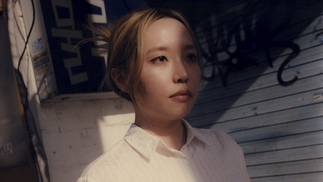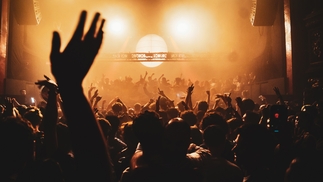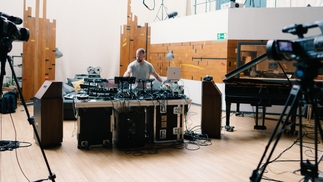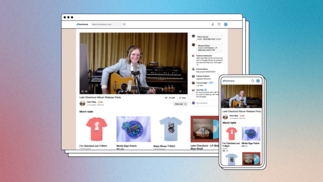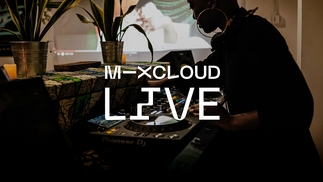REVIEW: SCUBA LIVE!
Scuba (stage) diving!
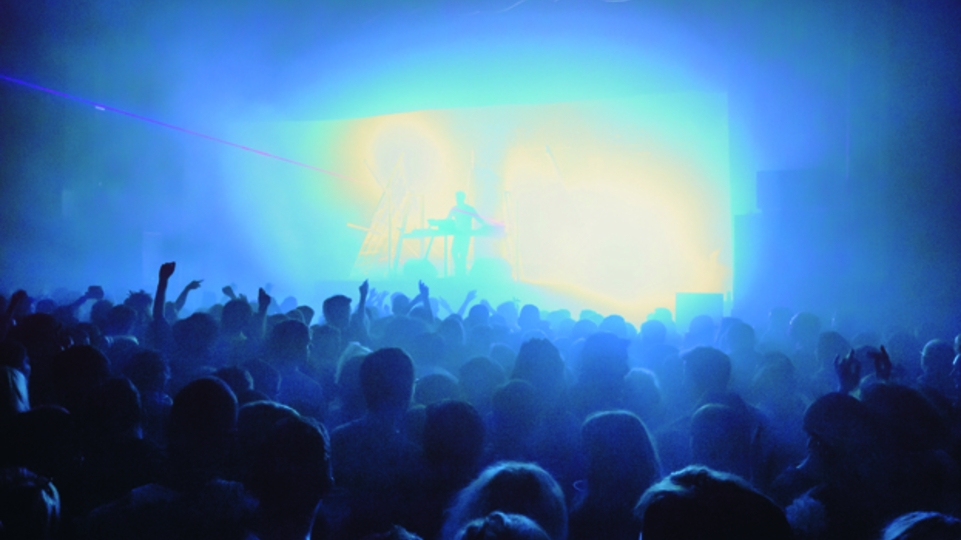
Paul Rose’s transition, from murky dubstep darling to stadium-filling dance superstar, moves on another step. Scuba live, bristling with lasers and conducted from a podium that makes Rose look he’s on the bridge of a starship, is more Underworld than underworld. The Kentish Town Forum has never seemed further from Plastic People.
It’s not until Scuba takes to the stage that the venue starts to make any sense. The Forum is a cave, a gaping proscenium arch that dwarfs the diminutive figure of South London Ordnance, gamely knocking his garage-inflected deep house out into the ether. He’s perched on a stage that’s been graced by Kiss and the Wu-Tang Clan, and you’d imagine they made a rather more impressive spectacle than a lonely man stood behind a table. This is the trouble with sticking DJs on stages, rather than hiding them in a dark corner –when they loom above you, like a silent TV in a pub, you can’t help your eyes being dragged to them.
Despite the difficulties inherent in playing at 10pm to a mostly empty room on a hubristic stage, South London Ordnance makes a solid fist of things. His sound is Hotflush through and through; low-slung rhythms that swagger out of the speaker racks, thick with sub, as hi-hats skitter across the top end. It’s the restrained hand of a man who knows how to work a cold crowd, the odd highlight, like his own 'Transmission Funk, emerging singular from a subdued sea of bass.
Part of the problem lies in the early door time. For clubbers not used to leaving their house until gone midnight, hitting a club at 10pm means that until they’ve got a couple of Carlings down their neck, the atmosphere’s as flat as the beer. It feels a little like a mid-afternoon festival tent; lots of space, and a crowd still working itself into gear. So when the duo of Jimmy Edgar and Travis 'Machinedrum' Stewart hit the stage, amid the incongruous chords of Todd Terje’s 'Inspector Norse', their bass-heavy blend of 808s and clacking snares just feels a touch disjointed.
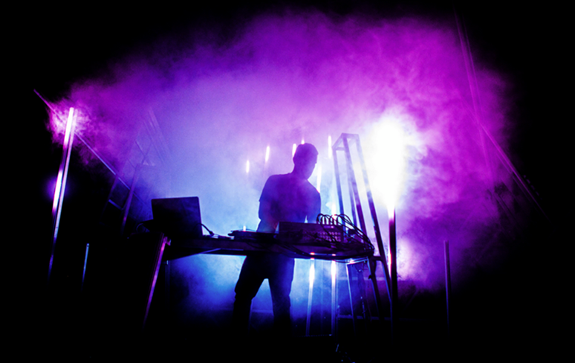
J.E.T.S. is big music that should fill this big room, but the segues between stepping rhythms and out-and-out house are too schizophrenic. The duo have been producing and playing together for a long time, but the live show feels too much like a back-to-back set, the contrasts harsh and with little sense of continuity. You’d think that two producers who, solo, produce such disparate records would craft a live show that felt more, well, live, but J.E.T.S. falls into the trap of laptop-sporting men on a stage. A very big stage, and one they can’t quite fill. But, in a way, that just makes what follows more impressive.
J.E.T.S. done, a 15-minute parade of roadies heralds the arrival of our headliner. The room’s buzzing by now, and an interlude that would murder a club atmosphere only builds the anticipation. By this point most people have embraced the gig-not-rave vibe, and when the curtains part to a fog of dry-ice and Close Encounters style overture, the arms go up and throats ring out as if Gene Simmons is about to stride across the stage.
Scuba’s rig is a scaled down version of Daft Punk’s LED-littered pyramid awash with the Chemical Brothers’ wrist-thick lasers, and the control console from Richie Hawtin’s Plastikman tour. It’s the iteration of Scuba he’s been hinting at since 'Adrenalin'’s pupil-dilating proto-trance signalled a hard right turn, away from the introspection of his first two albums. The live show is understandably heavy on his most recent records, with the rave-tinged chords of 'NE1BUTU' and 'July' made even more ecstatic by the epileptic visuals.
But despite his recent promiscuity, Rose doesn’t quite have the back catalogue of a Daft Punk, or a Chemical Brothers, or even an Orbital, which make these shows so exciting. Despite the odd moment where the beats drop into half-time, his first two records are largely unsuitable for this stadium-filling setup, and he has to rely largely on the last 18 months of output. Records that in a DJ set remain sure-fire floor-fillers – his output as SCB especially – feel flat amid the ecstasy. Still, for every momentary lull, Rose can batter his crowd back into life with a record like 'The Hope'.
George FitzGerald’s thankless task of following up is handled with aplomb, big-room house and stepping bass music keeping most of the bodies from the smoking area exodus, and culminating in his own reworking of Jessie Ware’s 'No To Love', which gets the requisite sing-a-long. Then it’s out into the frosty north London air, at the unheard of hour at two o’clock.
